Calcium channel blockers versus other classes of drugs for hypertension
- PMID: 35000192
- PMCID: PMC8742884
- DOI: 10.1002/14651858.CD003654.pub6
Calcium channel blockers versus other classes of drugs for hypertension
Abstract
Background: This is the first update of a review published in 2010. While calcium channel blockers (CCBs) are often recommended as a first-line drug to treat hypertension, the effect of CCBs on the prevention of cardiovascular events, as compared with other antihypertensive drug classes, is still debated.
Objectives: To determine whether CCBs used as first-line therapy for hypertension are different from other classes of antihypertensive drugs in reducing the incidence of major adverse cardiovascular events.
Search methods: For this updated review, the Cochrane Hypertension Information Specialist searched the following databases for randomised controlled trials (RCTs) up to 1 September 2020: the Cochrane Hypertension Specialised Register, the Cochrane Central Register of Controlled Trials (CENTRAL 2020, Issue 1), Ovid MEDLINE, Ovid Embase, the World Health Organization International Clinical Trials Registry Platform, and ClinicalTrials.gov. We also contacted the authors of relevant papers regarding further published and unpublished work and checked the references of published studies to identify additional trials. The searches had no language restrictions.
Selection criteria: Randomised controlled trials comparing first-line CCBs with other antihypertensive classes, with at least 100 randomised hypertensive participants and a follow-up of at least two years.
Data collection and analysis: Three review authors independently selected the included trials, evaluated the risk of bias, and entered the data for analysis. Any disagreements were resolved through discussion. We contacted study authors for additional information.
Main results: This update contains five new trials. We included a total of 23 RCTs (18 dihydropyridines, 4 non-dihydropyridines, 1 not specified) with 153,849 participants with hypertension. All-cause mortality was not different between first-line CCBs and any other antihypertensive classes. As compared to diuretics, CCBs probably increased major cardiovascular events (risk ratio (RR) 1.05, 95% confidence interval (CI) 1.00 to 1.09, P = 0.03) and increased congestive heart failure events (RR 1.37, 95% CI 1.25 to 1.51, moderate-certainty evidence). As compared to beta-blockers, CCBs reduced the following outcomes: major cardiovascular events (RR 0.84, 95% CI 0.77 to 0.92), stroke (RR 0.77, 95% CI 0.67 to 0.88, moderate-certainty evidence), and cardiovascular mortality (RR 0.90, 95% CI 0.81 to 0.99, low-certainty evidence). As compared to angiotensin-converting enzyme (ACE) inhibitors, CCBs reduced stroke (RR 0.90, 95% CI 0.81 to 0.99, low-certainty evidence) and increased congestive heart failure (RR 1.16, 95% CI 1.06 to 1.28, low-certainty evidence). As compared to angiotensin receptor blockers (ARBs), CCBs reduced myocardial infarction (RR 0.82, 95% CI 0.72 to 0.94, moderate-certainty evidence) and increased congestive heart failure (RR 1.20, 95% CI 1.06 to 1.36, low-certainty evidence).
Authors' conclusions: For the treatment of hypertension, there is moderate certainty evidence that diuretics reduce major cardiovascular events and congestive heart failure more than CCBs. There is low to moderate certainty evidence that CCBs probably reduce major cardiovascular events more than beta-blockers. There is low to moderate certainty evidence that CCBs reduced stroke when compared to angiotensin-converting enzyme (ACE) inhibitors and reduced myocardial infarction when compared to angiotensin receptor blockers (ARBs), but increased congestive heart failure when compared to ACE inhibitors and ARBs. Many of the differences found in the current review are not robust, and further trials might change the conclusions. More well-designed RCTs studying the mortality and morbidity of individuals taking CCBs as compared with other antihypertensive drug classes are needed for patients with different stages of hypertension, different ages, and with different comorbidities such as diabetes.
پیشینه: این نخستین نسخه بهروز شده از مروری است که در سال 2010 منتشر شد. در حالی که تجویز مسدود کنندههای کانال کلسیم (calcium channel blockers; CCBs) اغلب به عنوان داروی خط اول درمان هیپرتانسیون توصیه میشوند، تاثیر آنها بر پیشگیری از حوادث قلبیعروقی، در مقایسه با دیگر گروههای دارویی ضد‐هیپرتانسیون، همچنان مورد بحث است. اهداف: تعیین این که CCBهای مورد استفاده به عنوان درمان خط اول هیپرتانسیون، متفاوت از دیگر گروههای دارویی ضد‐هیپرتانسیون در کاهش بروز حوادث عمده قلبیعروقی هستند یا خیر. روشهای جستوجو: در این مرور بهروز شده، متخصص اطلاعات گروه هیپرتانسیون در کاکرین برای یافتن کارآزماییهای تصادفیسازی و کنترل شده (randomised controlled trials; RCTs)، بانکهای اطلاعاتی زیر را تا 1 سپتامبر 2020 جستوجو کرد: پایگاه ثبت تخصصی گروه هیپرتانسیون در کاکرین؛ پایگاه ثبت مرکزی کارآزماییهای کنترل شده کاکرین (CENTRAL؛ 2020، شماره 1)؛ Ovid MEDLINE؛ Ovid Embase؛ پلتفرم بینالمللی پایگاه ثبت کارآزماییهای بالینی سازمان جهانی بهداشت و ClinicalTrials.gov. همچنین با نویسندگان مقالات مرتبط در رابطه با کارهای منتشر شده و منتشر نشده دیگر تماس گرفته و منابع مطالعات منتشر شده را برای شناسایی کارآزماییهای تکمیلی بررسی کردیم. جستوجوها هیچ گونه محدودیتی را از نظر زبان نگارش مطالعه اعمال نکردند. معیارهای انتخاب: کارآزماییهای تصادفیسازی و کنترل شدهای که CCBهای خط اول را با دیگر گروههای دارویی ضد‐هیپرتانسیون مقایسه کرده، حداقل 100 شرکتکننده تصادفیسازی شده مبتلا به هیپرتانسیون داشته، و حداقل دو سال بازه زمانی پیگیری را گزارش کردند. گردآوری و تجزیهوتحلیل دادهها: سه نویسنده مرور بهطور مستقل از هم کارآزماییهای وارد شده را انتخاب کرده، خطر سوگیری (bias) را ارزیابی، و دادهها را برای آنالیز وارد کردند. هر گونه اختلافنظری از طریق بحث و تبادل نظر، حلوفصل شد. برای کسب اطلاعات بیشتر، با نویسندگان مطالعه تماس گرفتیم. نتایج اصلی: این بهروزرسانی، شامل پنج کارآزمایی جدید است. در مجموع 23 RCT (18 مورد دیهیدروپیریدینها (dihydropyridines)، 4 مورد غیر‐دیهیدروپیریدینها، 1مورد نامشخص) را با 153,849 شرکتکننده مبتلا به هیپرتانسیون وارد کردیم. مورتالیتی به هر علتی، میان CCBهای درمان خط اول و دیگر گروههای دارویی ضد‐هیپرتانسیون، تفاوتی نداشت. CCBها در مقایسه با دیورتیکها، احتمالا میزان وقوع حوادث قلبیعروقی عمده (خطر نسبی (RR): 1.05؛ 95% فاصله اطمینان (CI): 1.00 تا 1.09؛ P = 0.03) و حوادث مرتبط با نارسایی احتقانی قلبی (RR: 1.37؛ 95% CI؛ 1.25 تا 1.51؛ شواهد با قطعیت متوسط) را افزایش دادند. CCBها در مقایسه با بتا‐بلاکرها منجر به کاهش پیامدهای زیر شدند: حوادث عمده قلبیعروقی (RR: 0.84؛ 95% CI؛ 0.77 تا 0.92)، سکته مغزی (RR: 0.77؛ 95% CI؛ 0.67 تا 0.88؛ شواهد با قطعیت متوسط)، و مورتالیتی قلبیعروقی (RR: 0.90؛ 95% CI؛ 0.81 تا 0.99؛ شواهد با قطعیت پائین). CCBها در مقایسه با مهار کنندههای آنزیم مبدل آنژیوتانسین (angiotensin‐converting enzyme; ACE)، باعث کاهش خطر وقوع سکته مغزی (RR: 0.90؛ 95% CI؛ 0.81 تا 0.99؛ شواهد با قطعیت پائین) و افزایش خطر نارسایی احتقانی قلبی (RR: 1.16؛ 95% CI؛ 1.06 تا 1.28؛ شواهد با قطعیت پائین) شدند. CCBها در مقایسه با مهار کنندههای گیرنده آنژیوتانسین (angiotensin receptor blockers; ARBs) باعث کاهش خطر وقوع انفارکتوس میوکارد (RR: 0.82؛ 95% CI؛ 0.72 تا 0.94؛ شواهد با قطعیت متوسط) و افزایش خطر نارسایی احتقانی قلبی (RR: 1.20؛ 95% CI؛ 1.06 تا 1.36؛ شواهد با قطعیت پائین) شدند. نتیجهگیریهای نویسندگان: برای درمان هیپرتانسیون، شواهدی با قطعیت متوسط وجود دارد که دیورتیکها خطر بروز حوادث عمده قلبیعروقی و نارسایی احتقانی قلب را بیش از CCBها کاهش میدهند. شواهدی با قطعیت پائین تا متوسط به دست آمد که CCBها احتمالا بیشتر از بتا‐بلاکرها منجر به کاهش حوادث عمده قلبیعروقی میشوند. شواهدی با قطعیت پائین تا متوسط حاکی از آن است که CCBها در مقایسه با مهار کنندههای آنزیم مبدل آنژیوتانسین (ACE)، باعث کاهش خطر بروز سکته مغزی شده و در مقایسه با مسدود کنندههای گیرنده آنژیوتانسین (ARBs) به کاهش خطر وقوع انفارکتوس میوکارد میانجامند، اما احتمال وقوع نارسایی احتقانی قلبی را در مقایسه با مهار کنندههای ACE و ARBها بیشتر میکنند. بسیاری از تفاوتهای یافت شده در مرور فعلی قوی نیستند، و انجام کارآزماییهای بیشتر، ممکن است نتیجهگیری را تغییر دهد. انجام RCTهای بیشتری با روش انجام خوب که به مطالعه مورتالیتی و موربیدیتی در افراد دریافت کننده CCBها در مقایسه با دیگر گروههای داروهای ضد‐هیپرتانسیون در بیماران مبتلا به مراحل مختلف هیپرتانسیون، در سنین مختلف، و با بیماریهای همراه مختلف مانند دیابت بپردازند، مورد نیاز است.
Copyright © 2022 The Cochrane Collaboration. Published by John Wiley & Sons, Ltd.
Conflict of interest statement
Jiaying Zhu, Ning Chen, Muke Zhou, Jian Guo, Cairong Zhu, Jie Zhou, Mengmeng Ma, and Li He declare that they have no competing interests.
Figures

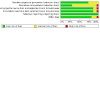
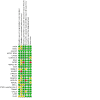
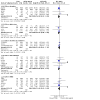
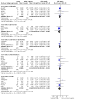
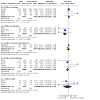
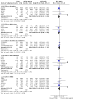
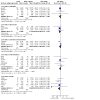
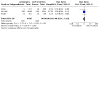
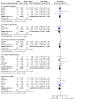
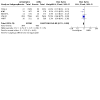
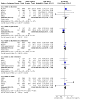
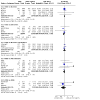
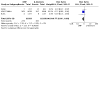
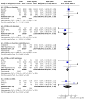
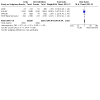
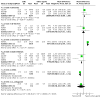
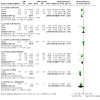
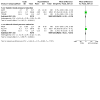
Update of
-
Calcium channel blockers versus other classes of drugs for hypertension.Cochrane Database Syst Rev. 2021 Oct 17;10(10):CD003654. doi: 10.1002/14651858.CD003654.pub5. Cochrane Database Syst Rev. 2021. Update in: Cochrane Database Syst Rev. 2022 Jan 9;1:CD003654. doi: 10.1002/14651858.CD003654.pub6. PMID: 34657281 Free PMC article. Updated.
References
References to studies included in this review
AASK {published data only}
-
- Agodoa LY, Appel L, Bakris GL, Beck G, Bourgoignie J, Briggs JP, et al. Effect of ramipril vs amlodipine on renal outcomes in hypertensive nephrosclerosis: a randomized controlled trial. JAMA 2001;285(21):2719-28. - PubMed
-
- Kusek JW, Lee JY, Smith DE, Milligan S, Faulkner M, Cornell CE, et al. Effect of blood pressure control and antihypertensive drug regimen on quality of life: The African American Study of Kidney Disease and Hypertension (AASK) Pilot Study. Controlled Clinical Trials 1996;16:40S-6S. - PubMed
-
- Norris K, Bourgoigne J, Gassman J, Hebert L, Middleton J, Phillips RA, et al. Cardiovascular outcomes in the African American Study of Kidney Disease and Hypertension (AASK) Trial. American Journal of Kidney Diseases 2006;48(5):739-51. - PubMed
-
- Wright JT, Bakris G, Greene T, Agodoa LY, Appel LJ, Charleston J, et al. Effect of blood pressure lowering and antihypertensive drug class on progression of hypertensive kidney disease: results from the AASK trial. JAMA 2002;288(19):2421-31. - PubMed
-
- Wright JT, Kusek JW, Toto RD, Lee JY, Agodoa LY, Kirk KA, et al. Design and baseline characteristics of participants in the African American Study of Kidney disease and hypertension (AASK) pilot study. Controlled Clinical Trials 1996;17(4 Suppl):3S-16S. - PubMed
ABCD {published data only}
-
- Estacio RO, Jeffers BW, Hiatt WR, Biggerstaff SL, Gifford N, Schrier RW, et al. The effect of nisoldipine as compared with enalapril on cardiovascular outcomes in patients with non-insulin-dependent diabetes and hypertension. New England Journal of Medicine 1998;338(10):645-52. - PubMed
-
- Savage S, Johnson Nagel N, Estacio RO, Feig PU, MacCarthy EP, Lukken NJ, et al. The ABCD (Appropriate Blood Pressure Control in Diabetes) trial: rationale and design of a trial of hypertension control (moderate or intensive) in type II diabetes. Online Journal of Current Clinical Trials 1993 Nov 24:Doc No 104. - PubMed
-
- Schrier R, Estacio R. Additional follow-up from the ABCD Trial in Patients with Type 2 Diabetes and Hypertension. New England Journal of Medicine 2000;343:1969. - PubMed
ALLHAT {published data only}
-
- Davis BR, Cutler JA, Gordon DJ, Furberg CD, Wright JT Jr, Cushman WC, et al. Rationale and design for the Antihypertensive and Lipid-Lowering Treatment to Prevent Heart Attack Trial (ALLHAT). American Journal of Hypertension 1996;9(4 Pt 1):342-60. - PubMed
-
- The ALLHAT Officers and Coordinators for the ALLHAT Collaborative Research Group. Major outcomes in high-risk hypertensive patients randomized to angiotensin-converting enzyme inhibitor or calcium channel blocker vs diuretic: The Antihypertensive and Lipid-Lowering Treatment to Prevent Heart Attack Trial (ALLHAT). JAMA 2002;288(23):2981-97. - PubMed
-
- The ALLHAT Officers and Coordinators for the ALLHAT Collaborative Research Group. Major outcomes in moderately hypercholesterolemic, hypertensive patients randomized to pravastatin vs usual care: the Antihypertensive and Lipid-Lowering Treatment to Prevent Heart Attack Trial. JAMA 2002;288:2998-3007. - PubMed
ASCOT‐BPLA {published data only}
-
- Dahlöf B, Sever PS, Poulter NR, Wedel H, Beevers DG, Caulfield M, et al. Prevention of cardiovascular events with an antihypertensive regimen of amlodipine adding perindopril as required versus atenolol adding bendroflumethiazide as required, in the Anglo-Scandinavian Cardiac Outcomes Trial-Blood Pressure Lowering Arm (ASCOTBPLA): a multicentre randomised controlled trial. Lancet 2005;366:895-906. - PubMed
-
- Sever PS, Dahlöf B, Poulter NR, Wedel H, Beevers G, Caulfield M, et al. Rationale, design, methods and baseline demography of participants of the Anglo-Scandinavian Cardiac Outcomes Trial. Journal of Hypertension 2001;19(6):1139-47. - PubMed
CASE‐J {published data only}
-
- Fukui T, Rahman M, Hayashi K, Takeda K, Higaki J, Sato T, et al. Candesartan Antihypertensive Survival Evaluation in Japan (CASE-J) trial of cardiovascular events in high-risk hypertensive patients: rationale, design, and methods. Hypertension Research 2003;26(12):979-90. - PubMed
-
- Ogihara T, Nakao K, Fukui T, Fukiyama K, Ueshima K, Oba K, et al. Effects of candesartan compared with amlodipine in hypertensive patients with high cardiovascular risks: Candesartan Antihypertensive Survival Evaluation in Japan trial. Hypertension 2008;51(2):393-8. - PubMed
-
- Ogihara T, Ueshima K, Nakao K, Fukiyama K, Oba K, Yasuno S, et al. Long-term effects of candesartan and amlodipine on cardiovascular morbidity and mortality in Japanese high-risk hypertensive patients: the Candesartan Antihypertensive Survival Evaluation in Japan Extension Study (CASE-J Ex). Hypertension Research 2011;34(12):1295-301. - PubMed
CONVINCE {published data only}
-
- Black HR, Elliott WJ, Grandits G, Grambsch P, Lucente T, White WB, et al. Principal results of the Controlled Onset Verapamil Investigation of Cardiovascular End Points (CONVINCE) trial. JAMA 2003;289(16):2073-82. - PubMed
-
- Black HR, Elliott WJ, Neaton JD, Grandits G, Grambsch P, Grimm RH Jr, et al. Baseline characteristics and early blood pressure control in the CONVINCE trial. Hypertension 2001;37(1):12-8. - PubMed
-
- Black HR, Elliott WJ, Neaton JD, Grandits G, Grambsch P, Grimm RH Jr, et al. Rationale and design for the Controlled Onset Verapamil Investigation of Cardiovascular Endpoints (CONVINCE) Trial. Controlled Clinical Trials 1998;19(4):370-90. - PubMed
ELSA {published data only}
-
- Zanchetti A, Bond MG, Hennig M, Neiss A, Mancia G, Dal Palù C, et al. Calcium antagonist lacidipine slows down progression of asymptomatic carotid atherosclerosis: principal results of the European Lacidipine Study on Atherosclerosis (ELSA), a randomized, double-blind, long-term trial. Circulation 2002;106(19):2422-7. - PubMed
FACET {published data only}
-
- Tatti P, Pahor M, Byington RP, Di Mauro P, Guarisco R, Strollo G, et al. Outcome results of the Fosinopril Versus Amlodipine Cardiovascular Events Randomized Trial (FACET) in patients with hypertension and NIDDM. Diabetes Care 1998;21(4):597-603. - PubMed
HOMED‐BP {published data only}
-
- Asayama K, Ohkubo T, Metoki H, Obara T, Inoue R, Kikuya M, et al. Cardiovascular outcomes in the first trial of antihypertensive therapy guided by self-measured home blood pressure. Hypertension Research 2012;35(11):1102-10. - PubMed
IDNT {published data only}
-
- Berl T, Hunsicker LG, Lewis JB, Pfeffer MA, Porush JG, Rouleau JL, et al. Cardiovascular outcomes in the Irbesartan Diabetic Nephropathy Trial of patients with type 2 diabetes and overt nephropathy. Annals of Internal Medicine 2003;138(7):542-9. - PubMed
-
- Lewis EJ, Hunsicker LG, Clarke WR, Berl T, Pohl MA, Lewis JB, et al. Renoprotective effect of angiotensin-receptor antagonist irbesartan in patients with nephropathy due to type 2 diabetes. New England Journal of Medicine 2001;245(12):851-60. - PubMed
-
- Rodby RA, Rohde RD, Clarke WR, Hunsicker LG, Anzalone DA, Atkins RC, et al. The Irbesartan Type II Diabetic Nephropathy Trial: study design and baseline patient characteristics. Nephrology Dialysis Transplantation 2000;15(4):487-97. - PubMed
INSIGHT {published data only}
-
- Brown MJ, Palmer CR, Castaigne A, Leeuw PW, Mancia G, Rosenthal T, et al. Morbidity and mortality in patients randomised to double-blind treatment with a long-acting calcium-channel blocker or diuretic in the International Nifedipine GITS study: Intervention as a Goal in Hypertension Treatment (INSIGHT). Lancet 2000;356(9227):366-72. - PubMed
INVEST {published data only}
-
- Pepine CJ, Handberg EM, Cooper-DeHoff RM, Marks RG, Kowey P, Messerli FH, et al. A calcium antagonist vs a non-calcium antagonist hypertension treatment strategy for patients with coronary artery disease. The International Verapamil-Trandolapril Study (INVEST): a randomized controlled trial. JAMA 2003;290(21):2805-16. - PubMed
-
- Pepine CJ, Handberg-Thurmond E, Marks RG, Conlon M, Cooper-DeHoff R, Volkers P, et al. Rationale and design of the International Verapamil SR/Trandolapril Study (INVEST). Journal of the American College of Cardiology 1998;32(5):1228-37. - PubMed
J‐MIC(B) {published data only}
-
- Yui Y, Sumiyoshi T, Kodama K, Hirayama A, Nonogi H, Kanmatsuse K, et al. Comparison of nifedipine retard with angiotensin converting enzyme inhibitors in Japanese hypertensive patients with coronary artery disease: the Japan Multicenter Investigation for Cardiovascular Diseases-B (JMIC-B) randomized trial. Hypertension Research 2004;27(3):181-91. - PubMed
MIDAS {published data only}
-
- Borhani NO, Mercuri M, Borhani PA, Buckalew VM, Canossa-Terris M, Carr AA, et al. Final outcome results of the Multicenter Isradipine Diuretic Atherosclerosis Study (MIDAS): a randomized controlled trial. JAMA 1996;276(10):785-91. - PubMed
-
- Borhani NO, Miller ST, Brugger SB, Schnaper HW, Craven TE, Bond MG, et al. MIDAS: hypertension and atherosclerosis, a trial of the effect of antihypertensive drug treatment on atherosclerosis. Journal of Cardiovascular Pharmacology 1992;19(Suppl 3):16-20. - PubMed
-
- Furberg C, Byington R, Borhani N. Design features: Multicenter Isradipine Diuretic Atherosclerosis Study (MIDAS). American Journal of Medicine 1989;86(Suppl 4A):37-9. - PubMed
NAGOYA {published data only}
-
- Matsushita K, Muramatsu T, Kondo T, Maeda K, Shintani S, Murohara T, et al. Rationale and design of the NAGOYA HEART Study: comparison between valsartan and amlodipine regarding morbidity and mortality in patients with hypertension and glucose intolerance. Journal of Cardiology 2010;56(1):111-7. - PubMed
-
- Muramatsu T, Matsushita K, Yamashita K, Kondo T, Maeda K, Shintani S, et al. Comparison between valsartan and amlodipine regarding cardiovascular morbidity and mortality in hypertensive patients with glucose intolerance: NAGOYA HEART Study. Hypertension 2012;59(3):580-6. - PubMed
NICS‐EH {published data only}
-
- Kuramoto K, National Intervention Cooperative Study Group. Treatment of elderly hypertensive in Japan: National Intervention Cooperative Study in Elderly Hypertensives. Journal of Hypertension 1994;12(Suppl 6):S35-40. - PubMed
-
- National Intervention Cooperative Study in Elderly Hypertensives Study Group. Randomized double-blind comparison of a calcium antagonist and a diuretic in elderly hypertensives. Hypertension 1999;34(5):1129-33. - PubMed
NORDIL {published data only}
-
- Hansson L, Hedner T, Lund-Johansen P, Kjeldsen SE, Lindholm LH, Syvertsen JO, et al. Randomised trial of effects of calcium antagonists compared with diuretics and β-blockers on cardiovascular morbidity and mortality in hypertension: the Nordic Diltiazem (NORDIL) study. Lancet 2000;356:359-65. - PubMed
-
- Hedner T. Progress report on the Nordic diltiazem study (NORDIL): an outcome study in hypertensive patients. Blood Pressure 1999;8(5-6):296-9. - PubMed
-
- NORDIL Study Group. The Nordic Diltiazem Study (NORDIL). A prospective intervention trial of calcium antagonist therapy in hypertension. Blood Pressure 1993;2:312-21. - PubMed
SHELL {published data only}
-
- Malacco E, Mancia G, Rappelli A, Menotti A, Zuccaro MS, Coppini A, et al. Treatment of isolated systolic hypertension: The SHELL Study results. Blood Pressure 2003;12:160-7. - PubMed
STOP‐Hypertension‐2 {published data only}
-
- Dahlöf B, Hansson L, Lindholm LH, Scherstén B, Wester PO, Ekbom T, et al. STOP-Hypertension-2: a prospective intervention trial of "newer" versus "older" treatment alternatives in old patients with hypertension. Blood Pressure 1993;2:136-41. - PubMed
-
- Hansson L, Lindholm LH, Ekbom T, Dahlöf B, Lanke J, Scherstén B, et al. Randomised trial of old and new antihypertensive drugs in elderly patients: cardiovascular mortality and morbidity the Swedish Trial in Old Patients with Hypertension-2 study. Lancet 1999;354:1751-6. - PubMed
-
- Lindholm LH, Hansson L, Dahlöf B, Ekbom T, Hedner T, De Faire U, et al. The Swedish Trial in Old Patients with Hypertension (STOP-Hypertension-2): a progress report. Blood Pressure 1996;5:300-4. - PubMed
TOMHS {published data only}
-
- Mascioli SR, Grimm RH Jr, Neaton JD, Stamler J, Prineas RJ, Cutler JA, et al. The Treatment of Mild Hypertension Study (TOMHS): characteristics of participants at baseline. American Journal of Cardiology 1990;66(9):32C-5C. - PubMed
-
- Neaton JD, Grimm RH Jr, Prineas RJ, Stamler J, Grandits GA, Elmer PJ, et al. Treatment of Mild Hypertension Study: final results. JAMA 1993;270:713-24. - PubMed
-
- Stamler J, Prineas RJ, Neaton JD, Grimm RH, McDonald RH, Schnaper HW, et al. Background and design of the new US trial on diet and drug treatment of 'mild' hypertension (TOMHS). American Journal of Cardiology 1987;59(14):51G-60G. - PubMed
-
- The Treatment of Mild Hypertension Research Group. The Treatment of Mild Hypertension Study. A randomized, placebo-controlled trial of a nutritional-hygienic regimen along with various drug monotherapies. Archives of Internal Medicine 1991;151:1413-23. - PubMed
VALUE {published data only}
-
- Julius S, Kjeldsen SE, Weber M, Brunner HR, Ekman S, Hansson L, et al. Outcomes in hypertensive patients at high cardiovascular risk treated with regimens based on valsartan or amlodipine: the VALUE randomised trial. Lancet 2004;363(9426):2022-31. - PubMed
-
- Mann J, Julius S. The Valsartan Antihypertensive Long-term Use Evaluation (VALUE) trial of cardiovascular events in hypertension. Rationale and design. Blood Pressure 1998;7(3):176-83. - PubMed
VART {published data only}
-
- Narumi H, Takano H, Shindo S, Fujita M, Mizuma H, Kuwabara Y, et al. Effects of valsartan and amlodipine on cardiorenal protection in Japanese hypertensive patients: the Valsartan Amlodipine Randomized Trial. Hypertension Research 2011;34(1):62-9. - PubMed
VHAS {published data only}
-
- Rosei EA, Dal Palù C, Leonetti G, Magnani B, Pessina A, Zanchetti A. Clinical results of the Verapamil in Hypertension and Atherosclerosis Study. Journal of Hypertension 1997;15(11):1337-44. - PubMed
-
- Zanchetti A, Rosei EA, Dal Palù C, Leonetti G, Magnani B, Pessina A. The Verapamil in Hypertension and Atherosclerosis Study (VHAS): results of long-term randomized treatment with either verapamil or chlorthalidone on carotid intima-media thickness. Journal of Hypertension 1998;16(11):1667-76. - PubMed
References to studies excluded from this review
Abascal 1998 {published data only}
-
- Abascal VM, Larson MG, Evans JC, Blohm AT, Poli K, Levy D, et al. Calcium antagonists and mortality risk in men and women with hypertension in the Framingham Heart Study. Archives of Internal Medicine 1998;158(17):1882-6. - PubMed
Abe 2013 {published data only}
-
- Abe M, Maruyama N, Suzuki H, Inoshita A, Yoshida Y, Okada K, et al. L/N-type calcium channel blocker cilnidipine reduces plasma aldosterone, albuminuria, and urinary liver-type fatty acid binding protein in patients with chronic kidney disease. Heart Vessels 2013;28:480-9. - PubMed
ACCOMPLISH {published data only}
-
- Jamerson K, Weber MA, Bakris GL, Dahlöf B, Pitt B, Shi V, et al. Benazepril plus amlodipine or hydrochlorothiazide for hypertension in high-risk patients. New England Journal of Medicine 2008;359(23):2417-28. - PubMed
Bakris 1996 {published data only}
-
- Bakris GL, Copley JB, Vicknair N, Sadler R, Leurgans S. Calcium channel blockers versus other antihypertensive therapies on progression of NIDDM associated nephropathy. Kidney International 1996;50(5):1641-50. - PubMed
Bakris 1997 {published data only}
-
- Bakris GL, Mangrum A, Copley JB, Vicknair N, Sadler R. Effect of calcium channel or β-blockade on the progression of diabetic nephropathy in African Americans. Hypertension 1997;29:744-50. - PubMed
BEAHIT {published data only}
Bhad 2011 {published data only}
-
- Bhad P, Ayalasomayajula S, Karan R, Leon S, Riviere GJ, Sunkara G, et al. Evaluation of pharmacokinetic interactions between amlodipine, valsartan, and hydrochlorothiazide in patients with hypertension. Journal of Clinical Pharmacology 2011;51:933-42. - PubMed
Calhoun 2013 {published data only}
CASE‐J Ex {published data only}
-
- Ogihara T, Ueshima K, Nakao K, Fukiyama K, Oba K, Yasuno S, et al. Long-term effects of candesartan and amlodipine on cardiovascular morbidity and mortality in Japanese high-risk hypertensive patients: the Candesartan Antihypertensive Survival Evaluation in Japan Extension Study (CASE-J Ex). Hypertension Research 2011;34(12):1295-301. - PubMed
Chen 2013 {published data only}
Cicero 2012 {published data only}
-
- Cicero AF, Gerocarni B, Rosticci M, Borghi C. Blood pressure and metabolic effect of a combination of lercanidipine with different antihypertensive drugs in clinical practice. Clinical & Experimental Hypertension (New York) 2012;34:113-7. - PubMed
COLM {published data only}
DEMAND {published data only}
-
- Ruggenenti P, Lauria G, Iliev IP, Fassi A, Ilieva AP, Rota S, et al. Effects of manidipine and delapril in hypertensive patients with type 2 diabetes mellitus: the delapril and manidipine for nephroprotection in diabetes (DEMAND) randomized clinical trial. Hypertension 2011;58(5):776-83. - PubMed
DHCCP {published data only}
-
- Bulpitt CJ, Palmer AJ, Beevers DG, Coles EC, Ledingham JG, Petrie JC, et al. Calcium channel blockers and cardiac mortality in the treatment of hypertension: a report from the Department of Health Hypertension Care Computing Project (DHCCP). Journal of Human Hypertension 1997;11:205-11. - PubMed
Espinel 1992 {published data only}
-
- Espinel CH, Bruner DE, Davis JR, Williams JL. Enalapril and verapamil in the treatment of isolated systolic hypertension in the elderly. Clinical Therapeutics 1992;14:835-44. - PubMed
FACTS {published data only}
-
- Pahor M, Franse LV, Deitcher SR, Cushman WC, Johnson KC, Shorr RI, et al. Fosinopril versus Amlodipine Comparative Treatments Study: a randomized trial to assess effects on plasminogen activator inhibitor-1. Circulation 2002;105:457-61. - PubMed
FEVER {published data only}
-
- Liu L, Zhang Y, Liu G, Li W, Zhang X, Zanchetti A, et al. The Felodipine Event Reduction (FEVER) Study: a randomized long-term placebo-controlled trial in Chinese hypertensive patients. Journal of Hypertension 2005;23(12):2157-72. - PubMed
GLANT {published data only}
-
- The GLANT Study Group. A 12-month comparison of ACE inhibitor and CA antagonist therapy in mild to moderate essential hypertension - The GLANT Study. Study Group on Long-term Antihypertensive Therapy. Hypertension Research 1995;18(3):235-44. - PubMed
Gottdiener 1997 {published data only}
-
- Gottdiener JS, Reda DJ, Williams DW, Materson BJ, Cushman W, Anderson RJ. Effect of single-drug therapy on reduction of left ventricular mass in mild to moderate hypertension. Circulation 1997;95:2007-14. - PubMed
HOT {published data only}
-
- Hansson L, Zanchetti A, Carruthers SG, Dahlöf B, Elmfeldt D, Julius S, et al. Effects of intensive blood-pressure lowering and low-dose aspirin in patients with hypertension: principal results of the Hypertension Optimal Treatment (HOT) randomised trial. Lancet 1998;351:1755-62. - PubMed
Kereiakes 2012 {published data only}
-
- Kereiakes DJ, Chrysant SG, Izzo JL Jr, Littlejohn T 3rd, Melino M, Lee J, et al. Olmesartan/amlodipine/hydrochlorothiazide in participants with hypertension and diabetes, chronic kidney disease, or chronic cardiovascular disease: a subanalysis of the multicenter, randomized, double-blind, parallel-group TRINITY study. Cardiovascular Diabetology 2012;11:134. - PMC - PubMed
Kes 2003 {published data only}
-
- Kes S, Caglar N, Canberk A, Deger N, Demirtas M, Dortlemez H, et al. Treatment of mild-to-moderate hypertension with calcium channel blockers: a multicentre comparison of once-daily nifedipine GITS with once-daily amlodipine. Current Medical Research and Opinion 2003;19:226-37. - PubMed
Kim 2011 {published data only}
-
- Kim CJ, Joe BH. Renin-guided versus routine treatment in young untreated hypertension: a randomized comparative pilot study. Journal of Hypertension 2011;29:e58-9.
Kojima 2013 {published data only}
-
- Kojima M, Okubo S, Mizubayashi R, Isaka N, Machida H, Okamoto S, et al. Kidney-protective effects of azelnidipine versus a diuretic in combination with olmesartan in hypertensive patients with diabetes and albuminuria: a randomized study. Nephrology Dialysis Transplantation 2013;28:1802-10. - PubMed
Lauria 2012 {published data only}
-
- Lauria G, Sghirlanzoni A. Effects of manidipine and delapril on type 2 diabetic neuropathy. A randomized, double-blind, placebo-controlled trial (the DEMAND study). Journal of the Peripheral Nervous System 2012;17:S30.
Leon 1993 {published data only}
-
- Leon AS. Efficacy and safety of enalapril versus extended-release nifedipine for the treatment of mild-to-moderate essential hypertension: A multicenter 22-week study. Clinical Therapeutics 1993;15:1094-107. - PubMed
Maharaj 1992 {published data only}
-
- Maharaj B, Byl K. A comparison of the acute hypotensive effects of two different doses of nifedipine. American Heart Journal 1992;124(3):720-5. - PubMed
Mesci 2011 {published data only}
-
- Mesci B, Tekin M. Are all fixed dose combinations equally effective in blood pressure control? The analysis of four different fixed dose antihypertensive combinations. Obesity Reviews 2011;12(7):568.
OSCAR {published data only}
-
- Kim-Mitsuyama S, Ogawa H, Matsui K, Jinnouchi T, Jinnouchi H, Arakawa K. An angiotensin II receptor blocker-calcium channel blocker combination prevents cardiovascular events in elderly high-risk hypertensive patients with chronic kidney disease better than high-dose angiotensin II receptor blockade alone. Kidney International 2013;83(1):167-76. - PMC - PubMed
Pahor 1995 {published data only}
-
- Pahor M, Guralnik JM, Corti MC, Foley DJ, Carbonin P, Havlik RJ. Long-term survival and use of antihypertensive medications in older persons. Journal of the American Geriatrics Society 1995;43(11):1191-7. - PubMed
Papademetriou 1997 {published data only}
-
- Papademetriou V, Gottdiener JS, Narayan P, Cushman WG, Zachariah PK, Gottdiener PS, et al. Hydrochlorothiazide is superior to isradipine for reduction of left ventricular mass: results of a multicenter trial. Journal of the American College of Cardiology 1997;30:1802-8. - PubMed
PRESERVE {published data only}
-
- Devereux RB, Palmieri V, Sharpe N, De Quattro V, Bella JN, Simone G, et al. Effects of once-daily angiotensin-converting enzyme inhibition and calcium channel blockade-based antihypertensive treatment regimens on left ventricular hypertrophy and diastolic filling in hypertension. The Prospective Randomized Enalapril Study Evaluating Regression of Ventricular Enlargement (PRESERVE) trial. Circulation 2001;104:1248-54. - PubMed
Psaty 1995 {published data only}
-
- Psaty BM, Heckbert SR, Koepsell TD, Siscovick DS, Raghunathan TE, Weiss NS, et al. The risk of myocardial infarction associated with antihypertensive drug therapies. JAMA 1995;274:620-5. - PubMed
Radevski 1999 {published data only}
-
- Radevski I, Skudicky D, Candy G, Sathekge S, Strugo V, Sareli P. Antihypertensive monotherapy with nisoldipine CC is superior to enalapril in black patients with severe hypertension. American Journal of Hypertension 1999;12:194-203. - PubMed
Schneider 1991 {published data only}
-
- Schneider E, Jennings A, Opie L. Captopril, nifedipine and their combination for therapy of hypertensive urgencies. South African Medical Journal 1991;80(6):265-70. - PubMed
STONE {published data only}
-
- Gong L, Zhang W, Zhu Y, Zhu J, Kong D, Pagé V, et al. Shanghai trial of nifedipine in the elderly (STONE). Journal of Hypertension 1996;14:1237-45. - PubMed
Syst‐China {published data only}
-
- Liu L, Wang JG, Gong L, Liu G, Staessen JA. Comparison of active treatment and placebo in older Chinese patients with isolated systolic hypertension. Systolic Hypertension in China (Syst-China) Collaborative Group. Journal of Hypertension 1998;16:1823-9. - PubMed
Syst‐Eur {published data only}
-
- Amery A, Birkenhäger W, Bulpitt CJ, Clément D, De Leeuw P, Dollery CT, et al. Syst-Eur: a multicentre trial on the treatment of isolated systolic hypertension in the elderly: objectives, protocol, and organization. Aging Clinical and Experimental Research 1991;3:287–302. - PubMed
-
- Staessen JA, Fagard R, Thijs L, Celis H, Arabidze GG, Birkenhäger WH, et al. Randomised double-blind comparison of placebo and active treatment for older patients with isolated systolic hypertension. Lancet 1997;350:757-64. - PubMed
-
- Staessen JA, Thijs L, Fagard RH, Birkenhäger WH, Arabidze G, Babeanu S, et al. Calcium channel blockade and cardiovascular prognosis in the European trial on isolated systolic hypertension. Hypertension 1998;32:410-6. - PubMed
Van Leeuwen 1995 {published data only}
-
- Leeuwen JT, Smit AJ, May JF, ten Berge BS, Hamer HP, Havinga TK, et al. Comparative effects of diltiazem and lisinopril on left ventricular structure and filling in mild-to-moderate hypertension. Journal of Cardiovascular Pharmacology 1995;26:983-9. - PubMed
Weir 1990 {published data only}
-
- Weir MR, Cassidy CA, Hall PS, Lancaster A, Schubert C, Urick A, et al. Efficacy and tolerability of enalapril and sustained-release verapamil in older patients with mild to moderate essential hypertension. Clinical Therapeutics 1990;12:139-48. - PubMed
Wen 2011 {published data only}
-
- Wen W, Liyuan M, Dingliang Z, Shuguang L, Shuping M, Xinhua T, al. Chinese hypertension intervention efficacy (CHIEF) study: randomized controlled trial of initial combination CCB-based antihypertensive in patients with hypertension to reduce cardiovascular events. Journal of Hypertension 2011;29:e17-8.
Zhang 2012 {published data only}
-
- Zhang Y, Zhang X, Liu L, Wang Y, Tang X, Zanchetti A, et al. Higher cardiovascular risk and impaired benefit of antihypertensive treatment in hypertensive patients requiring additional drugs on top of randomized therapy: is adding drugs always beneficial? Journal of Hypertension 2012;30:2202-12. - PubMed
Additional references
Angeli 2004
-
- Angeli F, Verdecchia P, Reboldi GP, Gattobigio R, Bentivoglio M, Staessen JA, et al. Calcium channel blockade to prevent stroke in hypertension: a meta-analysis of 13 studies with 103,793 subjects. American Journal of Hypertension 2004;17:817-22. - PubMed
Black 2004
-
- Black HR. Calcium channel blockers in the treatment of hypertension and prevention of cardiovascular disease: results from major clinical trials. Clinical Cornerstone 2004;6(4):53-66. - PubMed
BPLTTC 2000
-
- Blood Pressure Lowering Treatment Trialists' Collaboration. Effects of ACE inhibitors, calcium antagonists, and other blood pressure-lowering drugs: results of prospectively designed overviews of randomized trials. Lancet 2000;356:1955-64. - PubMed
BPLTTC 2003
-
- Blood Pressure Lowering Treatment Trialists' Collaboration. Effects of different blood pressure lowering regimens on major cardiovascular events: results of prospectively designed overviews of randomised trials. Lancet 2003;362:1527-35. - PubMed
Cheng 2014
Chobanian 2003
-
- Chobanian AV, Bakris GL, Black HR, Cushman WC, Green LA, Izzo JL Jr, et al. Seventh report of the Joint National Committee on Prevention, Detection, Evaluation, and Treatment of High Blood Pressure. Hypertension 2003;42:1206-52. - PubMed
Ezzati 2002
-
- Ezzati M, Lopez AD, Rodgers A, Vander Hoorn S, Murray CJ, Comparative Risk Assessment Collaborating Group. Selected major risk factors and global and regional burden of disease. Lancet 2002 Nov 2;360(9343):1347-60. - PubMed
Fergusson 2002
GBD 2015
-
- GBD 2013 Risk Factors Collaborators, Forouzanfar MH, Alexander L, Anderson HR, Bachman VF, Biryukov S, et al. Global, regional, and national comparative risk assessment of 79 behavioural, environmental and occupational, and metabolic risks or clusters of risks in 188 countries, 1990-2013: a systematic analysis for the Global Burden of Disease Study 2013. Lancet 2015;386:2287-323. - PMC - PubMed
Haller 2008
Hansson 1992
-
- Hansson L, Hedner T, Dahlöf B. Prospective Randomized Open Blinded End-point (PROBE) study. A novel design for intervention trials. Blood Pressure 1992;1:113-9. - PubMed
Higgins 2011
-
- Higgins JPT, Green S (editors). Cochrane Handbook for Systematic Reviews of Interventions Version 5.1.0 [updated March 2011]. The Cochrane Collaboration, 2011. Available from www.cochrane-handbook.org.
Higgins 2011a
-
- Higgins JPT, Altman DG, Sterne JAC, editor(s). Chapter 8: Assessing risk of bias in included studies. In: Higgins JPT, Green S, editor(s). Cochrane Handbook for Systematic Reviews of Interventions Version 5.1.0 (updated March 2011). The Cochrane Collaboration, 2011. Available at handbook.cochrane.org.
Higgins 2011b
-
- Higgins JPT, Deeks JJ, Altman DG, editor(s). Chapter 16: Special topics in statistics. In: Higgins JPT, Green S, editor(s). Cochrane Handbook for Systematic Reviews of Interventions Version 5.1.0 (updated March 2011). The Cochrane Collaboration, 2011. Available at handbook.cochrane.org.
JNC‐8
-
- James PA, Oparil S, Carter BL, Cushman WC, Dennison-Himmelfarb C, Handler J, et al. 2014 evidence-based guideline for the management of high blood pressure in adults: report from the panel members appointed to the Eighth Joint National Committee (JNC 8). JAMA 2014;311(5):507-20. - PubMed
Kannel 1991
-
- Kannel WB, Wilson PW, Zhang TJ. The epidemiology of impaired glucose tolerance and hypertension. American Heart Journal 1991;121:1268-73. - PubMed
Law 2009
Mancia 2007
-
- Mancia G, De Backer G, Dominiczak A, Cifkova R, Fagard R, Germano G, et al. 2007 Guidelines for the management of arterial hypertension: The Task Force for the Management of Arterial Hypertension of the European Society of Hypertension (ESH) and of the European Society of Cardiology (ESC). European Heart Journal 2007;28(12):1462-536. - PubMed
Opie 2000
-
- Opie LH, Yusuf S, Kübler W. Current status of safety and efficacy of calcium channel blockers in cardiovascular diseases: a critical analysis based on 100 studies. Progress in Cardiovascular Diseases 2000;43:171-96. - PubMed
Opie 2002
-
- Opie LH, Schall R. Evidence-based evaluation of calcium channel blockers for hypertension: equality of mortality and cardiovascular risk relative to conventional therapy. Journal of the American College of Cardiology 2002;39:315-22. - PubMed
Palmer 2015
-
- Palmer SC, Mavridis D, Navarese E, Craig JC, Tonelli M, Salanti G, et al. Comparative efficacy and safety of blood pressure-lowering agents in adults with diabetes and kidney disease: a network meta-analysis. Lancet 2015;385(9982):2047-56. - PubMed
Reboussin 2017
-
- Reboussin DM, Allen NB, Griswold ME, Guallar E, Hong Y, Lackland DT, et al. Systematic Review for the 2017 ACC/AHA/AAPA/ABC/ACPM/AGS/APhA/ASH/ASPC/NMA/PCNA Guideline for the Prevention, Detection, Evaluation, and Management of High Blood Pressure in Adults: A Report of the American College of Cardiology/American Heart Association Task Force on Clinical Practice Guidelines. Hypertension 2017 Nov 13 [Epub ahead of print]. [DOI: 10.1161/HYP.0000000000000067] - DOI
Ryan 2016
-
- Ryan R, Hill S. How to GRADE the quality of the evidence. Cochrane Consumers and Communication Group, available at cccrg.cochrane.org/author-resources. Version 3.0. 1 December 2016 (accessed prior to 2 January 2020).
Schünemann 2011a
-
- Schünemann HJ, Oxman AD, Higgins JPT, Vist GE, Glasziou P, Guyatt GH. Chapter 11: Presenting results and‘Summary of findings' tables. In: Higgins JPT, Green S, editors(s). Cochrane Handbook for Systematic Reviews of Interventions Version 5.1.0 (updated March 2011). The Cochrane Collaboration, 2011. Available from www.cochrane-handbook.org.
Schünemann 2011b
-
- Schünemann HJ, Oxman AD, Vist GE, Higgins JPT, Deeks JJ, Glasziou P, Guyatt GH, et al. Chapter 12: Interpreting results and drawing conclusions. In: Higgins JPT, Green S, editors(s). Cochrane Handbook for Systematic Reviews of Interventions Version 5.1.0 (updated March 2011). The Cochrane Collaboration, 2011, Available from www.cochrane-handbook.org.
Staessen 2003
-
- Staessen JA, Wang JG, Thijs L. Cardiovascular prevention and blood pressure reduction: a quantitative overview. Journal of Hypertension 2003;21:1055-76. - PubMed
Thomopoulos 2015
-
- Thomopoulos C, Parati G, Zanchetti A. Effects of blood pressure lowering on outcome incidence in hypertension: 4. Effects of various classes of antihypertensive drugs - overview and meta-analyses. Journal of Hypertension 2015;33(2):195-211. - PubMed
Triggle 2007
-
- Triggle DJ. Calcium channel antagonists: clinical uses - past, present and future. Biochemical Pharmacology 2007;74:1-9. - PubMed
Turnbull 2005
-
- Turnbull F, Neal B, Algert C, Chalmers J, Chapman N, Cutler J, et al. Effects of different blood pressure-lowering regimens on major cardiovascular events in individuals with and without diabetes mellitus: results of prospectively designed overviews of randomized trials. Archives of Internal Medicine 2005;165(12):1410-9. - PubMed
Verdecchia 2005
-
- Verdecchia P, Reboldi G, Angeli F, Gattobigio R, Bentivoglio M, Thijs L, et al. Angiotensin-converting enzyme inhibitors and calcium channel blockers for coronary heart disease and stroke prevention. Hypertension 2005;46:386-92. - PubMed
Whelton 2018
-
- Whelton PK, Carey RM, Aronow WS, Casey DE Jr, Collins KJ, Dennison Himmelfarb C, et al. 2017 ACC/AHA/AAPA/ABC/ACPM/AGS/APhA/ASH/ASPC/NMA/PCNA Guideline for the Prevention, Detection, Evaluation, and Management of High Blood Pressure in Adults: Executive Summary: a Report of the American College of Cardiology/American Heart Association Task Force on Clinical Practice Guidelines. Hypertension 2018;71(6):1269-324. - PubMed
Williams 2018
-
- Williams B, Mancia G, Spiering W, Agabiti Rosei E, Azizi M, Burnier M, et al. 2018 ESC/ESH Guidelines for the management of arterial hypertension. European Heart Journal 2018;39(33):3021-104. - PubMed
Wiysonge 2007
Wright 2018
Xie 2016
-
- Xie X, Atkins E, Lv J, Bennett A, Neal B, Ninomiya T, et al. Effects of intensive blood pressure lowering on cardiovascular and renal outcomes: updated systematic review and meta-analysis. Lancet 2016;387(10017):435-43. - PubMed
Zanchetti 2005
-
- Zanchetti A. Evidence-based medicine in hypertension: what type of evidence? Journal of Hypertension 2005;23:1113-20. - PubMed
References to other published versions of this review
Chen 2010
Pahor 2000
-
- Pahor M, Psaty BM, Alderman MH, Applegate WB, Williamson JD, Cavazzini C, et al. Health outcomes associated with calcium antagonists compared with other first-line antihypertensive therapies: a meta-analysis of randomised controlled trials. Lancet 2000;356(9246):1949-54. [MEDLINE: ] - PubMed
Publication types
MeSH terms
Substances
LinkOut - more resources
Full Text Sources
Medical
Research Materials
Miscellaneous

